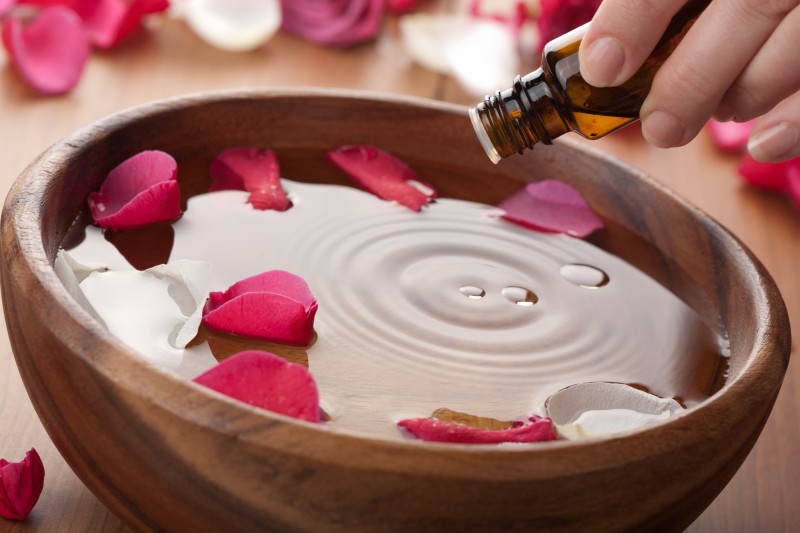 Essential oil is a very concentrated liquid that has been extracted from a plant source. There are hundreds are variations of essential oil. The liquid has historically been used for its healing properties, both mentally and physically. Many people believe that essential oils can help heal the body, calm the mind, and even cleanse the atmosphere inside of homes.
Essential oil is a very concentrated liquid that has been extracted from a plant source. There are hundreds are variations of essential oil. The liquid has historically been used for its healing properties, both mentally and physically. Many people believe that essential oils can help heal the body, calm the mind, and even cleanse the atmosphere inside of homes.
Essential oils are very concentrated, and so cannot be consumed directly in their concentrated form. For some kinds of essential oil, you can dilute them and ingest very small amounts, but most people advise against ever consuming essential oil. Some types are vaporized and inhaled.
Overall, essential oils are often diluted and then applied to the skin. Virtually all varieties of essential oils have antibacterial, antiviral, or anti-fungal properties, so it makes sense that they have been used to treat illness for such a long time. Recently, scientists have been examining the physiological effects of things like essential oils in the laboratory.
Quite a few researchers have found that certain essential oils may be able to prevent or even treat cancer! Unlike chemotherapy, essential oils are natural and do not produce negative side effects when used correctly. Here are six well-known essential oils that have demonstrated anti-cancer properties.
Chamomile essential oil
Chamomile is commonly used to help treat gastrointestinal issues, inflammation, and muscle spasms. Chamomile tea is a popular herbal drink, though chamomile oil can also be applied directly to the skin.
Can Chamomile prevent or treat cancer? Let’s find out…
A study published in the Journal Of Agricultural And Food Chemistry compared the effects of chamomile extract on normal cells versus cancer cells. For the normal cells, it had a very small effect on their growth, but for cancer cells, it had a significant effect.
The chamomile essential oil caused cell death in the cancer cells; it and was able to inhibit cancer growth yet not destroy the surrounding healthy tissue.
Chamomile also contains a flavonoid called apigenin, which is thought to be the reason that it can help treat cancer.
A study published in the Journal Of Cancer Research found that apigenin has a positive effect on stopping the growth of both breast cancer and colorectal cancer cells.
Frankincense essential oil
Frankincense can help treat arthritis, respiratory disease, and general inflammation. It is traditionally used in incense, and the oil can be applied directly to the skin or inhaled from a vaporizer.
A study published in the BMC Complementary And Alternative Medicine Journal found that frankincense essential oil disrupts pancreatic cancer cells and even causes apoptosis, or programmed cell death.
Another study published in the same journal found that frankincense essential oil lowers the viability of bladder cancer cells while not having a negative effect on the surrounding healthy cells.
Researchers at the University of Leicester found that frankincense is effective at killing ovarian cancer cells, likely due to the compound AKBA. AKBA seems to be able to target cancer cells, which is why frankincense essential oil can spare healthy cells while still killing cancer cells.
Oregano essential oil
Oregano increases nutrient absorption, can act as an antibiotic, and helps to heal symptoms of leaky gut. Oregano is a very common spice used for cooking, but it also comes in an essential oil form that is used for healing.
A study published in the Journal Of Medicinal Food found that oregano oil successfully inhibits the growth of cancer cells in both breast and colon tissues.
Another study, published in the Journal Of In Vitro Cellular & Developmental Biology, found that oregano oil limits cancer growth by reducing oxidative stress within the body.
Yet another study, published in the Journal Of Plant Foods For Human Nutrition, found that oregano oil has fantastic bio-protective qualities, including a potential ability to prevent cancer from growing.
One component of oregano is called carvacrol. It is thought that the carvacrol in oregano is what is responsible for causing cell death in cancer cells.
Thyme essential oil
Thyme can help treat arthritis, increase blood circulation, and improve immune system function. Thyme is a common dry spice used for cooking, though it can also be applied directly to the skin.
A study published in the Journal Of Herbal Medicine: Biomolecular And Clinical Aspects found that thyme leaves and isolated components within the leaves had a strong positive effect on liver and colon cancer cells.
Another study published in the Molecules Journal found that thyme essential oil is one of the most effective essential oils at healing prostate, breast, and lung cancers.
Yet another study, published in the International Journal Of Cancer Research And Treatment, found thyme essential oil to be effective at inhibiting the growth of head and neck cancers by regulating various cellular pathways. The researchers determined that the thyme oil extract is toxic to the cancer cells.
Rosemary essential oil
Rosemary can help improve your memory, reduce indigestion, and stimulate hair growth. Rosemary is also a common herb used for both cooking and herbal medicine.
A study published in the International Journal Of Oncology found that rosemary essential oil is effective at reducing the growth of colon cancer cells, likely due to a component called carnosol. They found that carnosol is able to trigger cell death in colon cancer cells.
Another study, published in the Molecules Journal, found that rosemary essential oil is considered toxic to cancer cells. Rosemary is rich in antioxidants, such as rosmarinic acid and caffeic acid.
Antioxidants work to prevent cell damage done by free radicals, and therefore play an important role in preventing diseases, including cancer.
A study published in the Indian Journal Of Experimental Biology found that rosmarinic acid has strong anti-tumor properties and may be able to prevent skin cancer.
Eucalyptus essential oil
Eucalyptus can help reduce fatigue, treat respiratory problems such as asthma, and regulate blood sugar. Eucalyptus is frequently used in cosmetic products, but is used topically for medicinal properties as well.
A study published in the Journal Of Evidence-Based Complementary And Alternative Medicine found that eucalyptus essential oil is toxic to cancer cells and therefore has significant anti-tumor properties.
The researchers believe that the oil triggers apoptosis, or cell death, in the cancer cells.
Another study, published in the Journal Of Cancer Letters, tested the effects of eucalyptus leaf extracts on mice. They found that extracts stopped the growth of skin cancer cells.
Yet another study, published in the Journal Of Phytochemistry, isolated a compound called cladocalol from the eucalyptus plant and found that it has positive effects on leukemia cells.
Besides using essential oils, go to the next page and learn more about the ‘most powerful healing nutrient known to man’ for a stronger immune system.
About the Author:
Emma Deangela is the best selling author of The Alkaline Diet Program and 80/20 Fat Loss. She has helped over tens of thousands of men and women to lose weight and transform their health with sound nutrition advice.
Have you tried essential oils before? What brands do you buy? Do you find it beneficial to your health?
Please help them by sharing this eye-opening article with each of them using any of the social media and email buttons below.


Leave a Reply